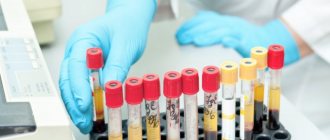This macroelement is responsible for general health, participates in metabolism, bone tissue formation, regulates hormonal balance, ensures proper absorption of nutrients, and normal muscle contractility. Measuring calcium levels is necessary to diagnose dangerous conditions and prevent systemic diseases. Pathologies are indicated by both deficiency and excess of the mineral.
Calcium levels in the body
Blood contains only 1% of the total amount of calcium contained in the body. The rest is concentrated in tissue cells, forming combinations with phosphorus. Plasma is saturated with several forms of the mineral:
- ionized or free calcium (Ca2+), its share: 52–58%;
- associated with protein fractions: up to 38%;
- complexed: composed of salts with bicarbonates, lactates, phosphates and citrates: about 10%.
A normal general level of calcium ensures healthy metabolism, delivery and absorption of other minerals into cells, absorption of vitamins, synthesis of hormones, formation of structures of the skeletal system, teeth, and soft tissues. It is necessary for hematopoiesis, proper functioning of the central nervous system, and maintaining salt metabolism.
The overall level of an essential macronutrient in the body varies depending on age and physical condition. Its general indicators for different categories:
- 1.9–2.6 mmol/l: in newborns;
- 2.25–2.7 mmol/l: in children under 4 years of age;
- 2.1–2.55 mmol/l: in children and adolescents under 18 years of age;
- 2.15–2.5 mmol/l: in adults;
- 2.22–2.55 mmol/l: in elderly people over 65 years of age.
To maintain the normal level of calcium, it must be supplied to the body daily through food. In childhood, the need for the element is about 200 to 1000 mg. Adults need 1200–1400 mg per day. During pregnancy and lactation in women, its dose should be at least 1500 mg. The absorption of the mineral is affected by:
- hormonal background;
- Lifestyle;
- food quality;
- level of phosphorus, magnesium, parathyroid hormone, active form of vitamin D in the body;
- the presence of systemic diseases.
With age, the absorption and content of calcium in the body inevitably decreases. This is caused by a decrease in the activity of the intestines, kidneys, and changes in the endocrine functions of the glands. The mineral is constantly consumed, its salts are excreted through urine and metabolic products, so the development of deficiency is more common than excess. But hypercalcemia is also a likely condition. It occurs due to increased levels of albumin in the blood. This protein provokes the accumulation of bound calcium, which affects its overall level.
General information
The macroelement circulates in the bloodstream in bound and free (ionized) form. If a person is healthy, the amount of these fractions is balanced. In some pathologies this balance is disrupted. In such cases, determining the amount of free fraction is of greatest diagnostic importance. It is this substance that has physiological activity and can be used by the body. Calcium is necessary for the human body to function normally. It is required for the transmission of nerve impulses, contraction of the muscles of the heart and skeleton, the formation and maintenance of normal bone structure, and blood clotting. Most of this macroelement is concentrated in bone tissue. No more than one percent of its total quantity circulates in the bloodstream. Ca is excreted from the body every day in urine. To maintain its reserves at a constant level, the daily intake of this macronutrient should be about one gram. Its amount is related to the level of phosphorus. There are several mechanisms for the exchange of this macronutrient. With a lack of calcium, phosphate levels increase. In this case, parathyroid hormone is produced, under the influence of which bone tissue is destroyed and the calcium necessary for the body is released. When there is an excess of calcium, calcitonin is synthesized in the thyroid gland. Under the influence of this substance, Ca moves from the bloodstream to bone tissue. The hormone produced by the parathyroid glands increases the absorption of Ca in the gastrointestinal tract.
This test determines the amount of cation in the bloodstream. It is impossible to assess calcium reserves in bone tissue based on its results; they characterize only the metabolism of the macroelement.
Indications for analysis
The study of biochemical blood parameters allows you to study in detail the condition of the body, exclude or confirm the development of a number of diseases, adjust the prescribed therapy regimen, and more successfully carry out rehabilitation treatment after surgery. There are two types of calcium testing:
- to the general level;
- for ionized calcium: a highly specialized, expensive, but more informative study.
Calcium testing is indicated for the following conditions:
- muscle weakness;
- frequent numbness of various parts of the body;
- arrhythmic manifestations, other signs of heart disease;
- disruption of the production of hormones of the adrenal glands, thyroid and parathyroid glands, ovaries;
- kidney pathologies;
- intestinal inflammation and malabsorption syndrome;
- oncological diseases;
- decreased albumin levels;
- suspected development of osteoporosis;
- blood clotting disorders;
- symptoms of hypocalcemia: drowsiness, dizziness, deterioration of teeth and nails, hair loss.
A calcium test is recommended before surgery, during the recovery period after complex physical injuries, internal organ transplantation, and blood transfusions.
Increasing values
- increased production of parathyroid hormones due to its benign growth or malignant tumor;
- bone metastases in kidney, lung, and breast cancer;
- a special type of malignant tumor - carcinoma, which produces parathyroid hormone, while the primary cancer can be in the uterus, ovaries, thyroid gland or kidneys;
- injuries and illnesses in which a person is forced to remain motionless for a long time, causing calcium from the bones to move into the blood - bone fractures, spinal tuberculosis, Paget's disease or damage to bone tissue with improper formation and resorption, congenital hip dislocation;
- increasing vitamin D levels;
- adrenal disease, especially insufficiency;
- hemoblastoses or tumor diseases of the blood and lymph - especially myeloma, accompanied by destruction of bone tissue;
- Williams syndrome or “elf face” is a genetic disorder where several genes are missing;
- kidney failure;
- granulomatous diseases, especially sarcoidosis;
- excessive intake of medications containing calcium;
- milk-base or Burnett syndrome, when there is a lot of calcium in the blood, and the acid-base balance is shifted to the alkaline side;
- overdose of diuretics containing thiazide, or substances that potently remove potassium and sodium.
Preparing for testing
A week before the test, it is recommended to refrain from drinking alcohol, potent drugs, vitamin-mineral complexes, fried, smoked and excessively salty foods. Strong coffee, which promotes increased removal of calcium from the plasma, is also not recommended.
It is not advisable to smoke or engage in heavy physical work for 24 hours before the test. Instrumental examinations and infusion procedures are also prohibited. The last meal and drinks should be no later than 12 hours before taking the sample. Then only pure still water is allowed.
Blood should be donated in the morning: optimally from 8 to 12 hours.
Antitumor, anticonvulsant drugs, diuretics, antibiotics and steroid hormones can distort test results. These medications cause a temporary decrease in calcium levels in the body.
Decrease values:
- DiGeorge syndrome, or a genetic disorder in which the parathyroid and thymus glands are underdeveloped or absent;
- dysfunction of the parathyroid glands due to its autoimmune lesion or surgical intervention;
- decreased magnesium levels;
- decreased vitamin D levels;
- liver and kidney damage, which reduces albumin levels;
- damage to pancreatic tissue or pancreatic necrosis;
- long-term use of certain medications;
- massive blood transfusion.
Causes of decreased calcium levels in the blood
Hypocalcemia is the scientific name for a condition characterized by low levels of calcium in the blood. Most often, its fall is caused by a decrease in the level of albumin (a protein component of blood). In this case, there is a deficiency of only protein-bound calcium, and ionized calcium will remain within normal limits.
Other reasons that can lead to hypocalcemia:
- Malfunction of the parathyroid glands, release of parathyroid hormone into the blood.
- Absence of parathyroid glands as a result of the operation.
- Lack of vitamin D.
- Chronic renal failure, nephritis.
- Spasmophilia and rickets in a child.
- Acute magnesium deficiency in the human body.
- The body's immunity to the effects of parathyroid hormone, caused by congenital developmental anomalies.
- Low calcium content in food consumed by a person.
- High levels of phosphates in the blood.
- Severe diarrhea.
- Serious liver damage (cirrhosis).
- The presence in the body of osteoblastic metastases, which require a lot of calcium to continue their pathological growth.
- Hyperplastic changes in adrenal tissue.
- Taking medications to treat epilepsy.
- Transfusion of impressive volumes of blood, which contains citrate.
- Alkalosis in the acute phase.
- Diseases such as: alcoholism, acute pancreatitis, colitis. They are combined into one group, since each of them does not allow calcium to be normally absorbed into the blood from the gastrointestinal tract.
4.What are the risks and what could interfere with the analysis?
What are the risks of a calcium blood test?
If you are taking a blood test for calcium, then possible risks may only be associated with taking blood from a vein. In particular, the appearance of bruises at the puncture site and inflammation of a vein or artery (phlebitis). Warm compresses several times a day will relieve phlebitis. If you are taking blood thinning medications, you may bleed at the puncture site.
What can affect the results of the analysis?
A calcium blood test may give inaccurate results if:
- You took calcium or vitamin D in any form (not only specially prepared preparations, but also, for example, dairy products) immediately before the test;
- You have had dialysis;
- You recently had a large blood transfusion.
Blood calcium is elevated, other tests have been taken - how to decipher them?
Of course, deciphering a blood test is the prerogative of the attending endocrinologist, and independent study of one’s blood test can lead the patient to diagnostic errors, however, within the framework of this article, we will give some information about the possible results of a laboratory examination for elevated blood calcium. Use the information obtained with caution and remember that it is not a substitute for consultation with a medical specialist.
So, possible options for laboratory results and their interpretation.
Blood calcium is increased, parathyroid hormone is increased, phosphorus is decreased, calcitonin is normal, calcium in daily urine is increased
– most likely, we are talking about primary hyperparathyroidism and the presence of a parathyroid adenoma. Additional examination is necessary using ultrasound of the thyroid gland and neck, scintigraphy of the parathyroid glands with technetril, and in some cases, computed tomography of the neck. It is treated surgically (endoscopic surgery through an incision about 2 cm long is possible in a specialized center).
Parathyroid hormone is elevated, calcium is normal, phosphorus is normal, calcitonin is normal
– with a high degree of probability we are talking about secondary hyperparathyroidism due to a banal deficiency of vitamin D in the blood. It is treated by taking vitamin D and calcium. It is important to exclude a laboratory error associated with an underestimation of the level of ionized calcium in the blood (it is better to retake the test for ionized calcium in a specialized laboratory of the endocrinology center).
Calcium in the blood is increased, parathyroid hormone is normal, phosphorus is normal, calcitonin is normal
– a neuroendocrine tumor that produces PTH-like peptides or forms lytic metastases in the bone should be suspected. Examination and treatment depend on the type of tumor detected.
High calcium in the blood (usually slightly increased calcium is observed), parathyroid hormone is moderately increased, phosphorus is normal, calcitonin is normal, calcium concentration in daily urine is reduced
– we can talk about a rare familial disease, the so-called familial benign hypocalciuric hypercalcemia. This disease is accompanied by a change in the sensitivity of cellular receptors to parathyroid hormone and impaired calcium excretion in the urine. Does not require treatment and is not dangerous. Often, inexperienced doctors diagnose primary hyperparathyroidism in such cases and refer the patient to unnecessary surgery to remove a non-existent parathyroid adenoma.
Ionized calcium is increased, total calcium is normal, parathyroid hormone is increased
– we are usually talking about parathyroid adenoma.
Ionized calcium is elevated, total calcium is below normal
– laboratory error must be excluded. The analysis should be re-taken in a specialized laboratory.
Ionized calcium in the blood is increased, parathyroid hormone is increased, calcitonin is increased
– the patient should be suspected of having both a parathyroid adenoma and medullary thyroid cancer. Together, these two diseases indicate a high probability that the patient has type IIA multiple endocrine neoplasia syndrome - a rare hereditary pathology transmitted in the family and leading to the development of three dangerous tumors: medullary thyroid cancer, parathyroid adenomas (usually multiple), pheochromocytoma (tumor adrenal gland, which produces adrenaline or norepinephrine). Urgent consultation with an endocrinologist or endocrinologist surgeon is required!
Calcium in the blood is elevated during the first test, I want to retake the test - what is the best way to do this?
If you want to check whether your blood calcium is really elevated and are going to take a second blood test, follow some important rules that will help the second test be as accurate as possible:
1. a blood test should be taken only in a specialized laboratory using high-quality equipment;
2. a blood test must be taken only on an empty stomach;
3. if you are taking vitamin D or calcium supplements (or combination medications with vitamin D and calcium), stop them at least 2-3 days before your blood test; the entry of calcium from the drug into the blood can lead to an increased calcium level in the blood - of course, in this case a falsely elevated calcium is detected.
Hypercalcemia: signs
But hypocalcemia is not the only danger. Excess calcium can also have unpleasant and even fatal consequences for the body, especially a growing one. Very often, this phenomenon occurs when dietary supplements are taken incorrectly. Symptoms of excess calcium:
- nausea;
- constipation;
- lack of appetite.
If there is a strong excess of calcium over a significant period, kidney stones can occur. Excess calcium also interferes with the absorption of zinc and iron, which can lead to anemia.
Children should receive a balanced diet so that all vitamins and minerals are properly absorbed. Every parent should remember this and then there will be no reason to worry.








